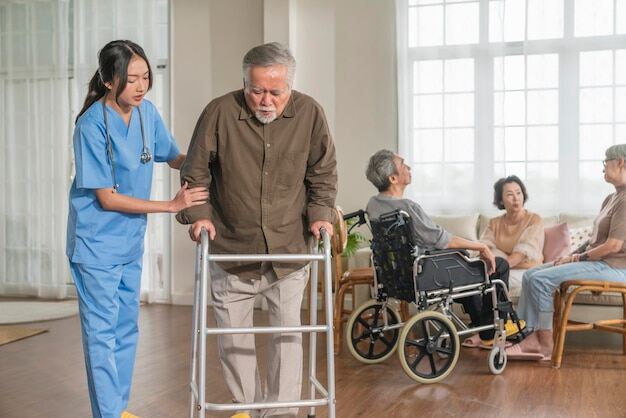What is CDPAP Home Care? CDPAP stands for Consumer Directed Personal Assistance Program. It is a...
What is Home Care? Understanding the Service
What is Home Care?
Home care is a vital aspect of eldercare that has gained increasing importance in recent years. As our loved ones age, their needs change, and ensuring their well-being becomes a priority. Home care offers a solution that allows elderly individuals to receive assistance and support in the comfort of their own homes.

For many families, the idea of moving their elderly members to a nursing home or assisted living facility may not align with their desires or values. Home care provides an alternative that allows aging loved ones to maintain their independence and quality of life while receiving the necessary help they require. It enables them to continue living in a familiar environment surrounded by the people and belongings they cherish most.
The Importance of Understanding Home Care Services and Their Benefits
Understanding the concept of home care and the range of services it encompasses is crucial for families with elderly members. By gaining knowledge about home care, families can make informed decisions about the best care options for their loved ones. This understanding empowers them to provide the necessary support while ensuring their elderly family members’ safety, well-being, and happiness.
Home care services go beyond mere physical assistance; they encompass a holistic approach to care that takes into account the emotional, social, and medical needs of the elderly individual. By comprehending the diverse services available through home care, families can ensure their loved ones receive personalized care that caters to their unique requirements.
Furthermore, being aware of the benefits of home care allows families to appreciate the positive impact it can have on the overall quality of life for their elderly members. Home care promotes independence, preserves dignity, and fosters a sense of autonomy for aging individuals. It enables them to maintain their daily routines, engage in activities they enjoy, and continue participating in their communities.
By delving into the world of home care, families can find solace in knowing that their elderly loved ones are receiving compassionate, professional care within the comforts of their own homes. In the following sections, we will explore the various types of home care services available, the benefits they offer, and how to find the right provider for your family’s needs.
What is Home Care?
Home care refers to a comprehensive range of support services provided to individuals, typically elderly or disabled, in the comfort of their own homes. The primary purpose of home care is to assist individuals with their activities of daily living (ADLs) and promote their overall well-being. It aims to enable aging loved ones to age in place by offering personalized care, support, and supervision tailored to their specific needs and preferences.
How home care differs from other types of care options.
What sets home care apart from other care options is its focus on maintaining a person’s independence and preserving their sense of familiarity and autonomy. Unlike nursing homes or assisted living facilities, home care allows individuals to remain in their own homes, surrounded by their personal belongings, memories, and loved ones. It provides a more intimate and personalized approach to caregiving, allowing for a higher level of individual attention and support.
Personalized and individualized nature
One of the most significant advantages of home care is the ability to tailor the services to the specific needs and preferences of the individual receiving care. Home care providers work closely with the family and the care recipient to develop a personalized care plan that addresses their unique requirements, routines, and goals. This individualized approach ensures that the care provided is focused on the well-being and comfort of the individual, promoting a sense of familiarity, control, and independence.
Home care providers not only assist with practical tasks but also develop meaningful relationships with their clients. They take the time to understand the individual’s personality, interests, and preferences, allowing for companionship and emotional support alongside the physical assistance. This personalized touch fosters a sense of trust, security, and comfort for the elderly individual, enhancing their overall quality of life.
Types of Home Care Services
Personal Care Assistance
One of the primary types of home care services is personal care assistance. This encompasses support with activities of daily living (ADLs) to help individuals maintain their personal hygiene, grooming, and mobility. Home care providers can assist with tasks such as bathing, dressing, toileting, grooming, and transferring from one position to another. By offering personalized assistance, personal care services ensure that individuals can maintain their dignity and well-being while aging in place.
Medication Management
Medication management is another vital aspect of home care services. Home care providers play a crucial role in ensuring that individuals take their medications correctly and on schedule. They can assist with medication reminders, organizing pillboxes, and administering medications as prescribed by healthcare professionals. Moreover, caregivers can monitor the individual’s medication regimen, track any side effects, and communicate with healthcare providers to ensure optimal medication management.
Companionship and Emotional Support
Companionship and emotional support are essential components of home care services. Aging loved ones often experience feelings of loneliness and social isolation, which can negatively impact their mental and emotional well-being. Home care providers offer companionship by engaging in meaningful conversations, participating in activities, and providing social interaction. By fostering a supportive and compassionate environment, caregivers promote cognitive stimulation, emotional well-being, and a sense of belonging for the individuals in their care.
Household Help
Home care services extend beyond personal care to include assistance with household tasks. Caregivers can help with meal planning and preparation, ensuring that individuals receive nutritious and balanced meals that align with their dietary needs. Additionally, they can provide support with light housekeeping tasks such as laundry, cleaning, and organizing. Caregivers may also assist with running errands, grocery shopping, or transportation to medical appointments, enabling individuals to maintain their independence and ensuring that their home environment remains safe and comfortable.
Medical Care
In some cases, home care may involve skilled nursing care or specialized medical services. Skilled nursing services provided at home may include wound care, intravenous therapy, or monitoring vital signs. Home care providers who are licensed nurses or healthcare professionals can manage complex medical conditions and provide necessary medical treatments. These specialized medical services enable individuals with specific healthcare needs to receive appropriate care in the familiar surroundings of their homes.
By offering a comprehensive range of services tailored to individual needs, home care promotes independence, enhances the quality of life, and allows elderly individuals to age in place while maintaining their dignity and sense of autonomy.

Benefits of Home Care
Familiar Environment
One of the significant benefits of home care is that it allows elderly individuals to receive care in their familiar environment – their own home. This familiarity offers a sense of comfort, security, and emotional well-being. Being surrounded by cherished belongings, memories, and the presence of loved ones can contribute to a higher quality of life and a greater sense of peace for aging individuals. The familiar environment of home helps reduce anxiety and stress often associated with transitioning to new living arrangements.
Personalized Care
Home care provides personalized care that is tailored to the unique needs of each individual. Care plans are developed with a focus on the specific requirements, preferences, and routines of the elderly person. This personalized approach ensures that the care provided is precisely what the individual needs, promoting their overall well-being and maximizing their independence. Whether it’s assistance with daily activities, medication management, or specialized medical care, home care services are designed to address the specific needs of the elderly individual, enhancing their comfort and quality of life.
Independence and Autonomy
Highlight how home care promotes independence by enabling individuals to maintain control over their daily routines and decisions.
Maintaining independence and autonomy is a fundamental aspect of aging with dignity. Home care allows elderly individuals to retain control over their daily routines, preferences, and decisions. Unlike institutional care settings, home care provides a more flexible approach that respects the individual’s choices and desires. Whether it’s deciding when to wake up, what to eat, or how to spend their day, home care empowers aging individuals to live life on their terms, fostering a greater sense of self-worth and fulfilment.
Lower Risk of Infections
Healthcare facilities, such as hospitals or nursing homes, can be breeding grounds for infectious diseases. Home care reduces the risk of exposure to germs and infections by allowing elderly individuals to remain in the safety and cleanliness of their own homes. With fewer people coming and going, the risk of contracting contagious illnesses is significantly reduced. Home care providers follow strict hygiene protocols and take necessary precautions to ensure a clean and safe environment for the individual, minimizing the likelihood of infections.
Family Involvement
Home care recognizes the importance of family involvement in the care of their elderly loved ones. Unlike institutional care settings where visiting hours may be restricted, home care encourages family members to actively participate in the care process. This involvement not only strengthens family bonds but also provides emotional support to the elderly individual. Family members can spend quality time with their loved ones, engage in activities together, and provide companionship, creating a nurturing and loving environment that promotes the individual’s overall well-being.
Finding the Right Home Care Provider
Researching and evaluating home care agencies or individual caregivers.
When it comes to finding the right home care provider, thorough research and evaluation are essential. Start by researching reputable home care agencies or individual caregivers in your area. Look for providers that have a strong track record of delivering high-quality care and have positive reviews from clients and their families. Explore their websites, read testimonials, and seek recommendations from healthcare professionals, friends, or support groups. The goal is to gather as much information as possible to make an informed decision.
Factors to consider when selecting a home care provider
Several factors should be taken into account when selecting a home care provider. First and foremost, consider the provider’s reputation and experience in the field. Look for certifications, licenses, and accreditations that demonstrate their commitment to maintaining high standards of care. Ensure that the provider has experience and expertise in offering the specific services required by the elderly individual.
Compatibility with the elderly individual’s needs is crucial. Consider the level of personalization and flexibility the provider offers to tailor their services to meet the unique needs and preferences of the individual. Assess if the provider’s philosophy of care aligns with your values and expectations. Additionally, check if the caregiver has received proper training and possesses the skills necessary to provide the specific type of care required, whether it’s personal care assistance, medication management, or specialized medical care.
Importance of communication and regular feedback with the chosen provider.
Once you have selected a home care provider, establishing open lines of communication is vital. Clear and frequent communication allows you to share important information about the individual’s needs, preferences, and any changes in their condition. A good provider should listen attentively, address any concerns, and be responsive to your queries or feedback. Regular check-ins and updates help ensure that the care plan remains effective and can be adjusted if necessary.
Feedback is a two-way street. Encourage the home care provider to provide regular updates on the individual’s progress and any observations they may have made. This feedback loop allows for ongoing evaluation and refinement of the care provided, ensuring that it continues to meet the evolving needs of the individual. Effective communication and feedback contribute to a collaborative and trusting relationship with the home care provider, ultimately benefiting the well-being of the elderly individual.
Conclusion
Home care plays a crucial role in supporting families with elderly members by providing personalized, compassionate care in the comfort of their own homes. Throughout this article, we have explored the definition and purpose of home care, highlighting its relevance for families with elderly individuals. We have also discussed the benefits of home care, such as familiarity with the environment, personalized care, independence and autonomy, lower risk of infections, and the opportunity for family involvement.
Furthermore, we delved into the various types of home care services available, including personal care assistance, medication management, companionship and emotional support, household help, and specialized medical care. Each of these services contributes to enhancing the overall well-being and quality of life of aging individuals.
Finding the right home care provider is a critical step in ensuring the well-being of your loved one. We emphasized the importance of thoroughly researching and evaluating home care agencies or individual caregivers, considering factors such as reputation, qualifications, and compatibility with the individual’s needs. Additionally, we highlighted the significance of establishing open communication channels and maintaining regular feedback with the chosen provider.


